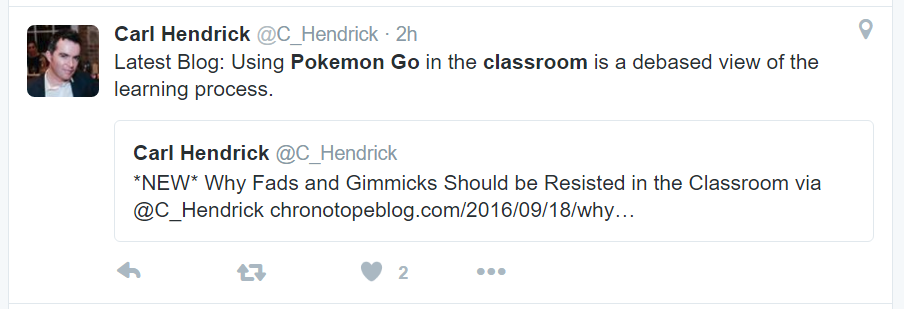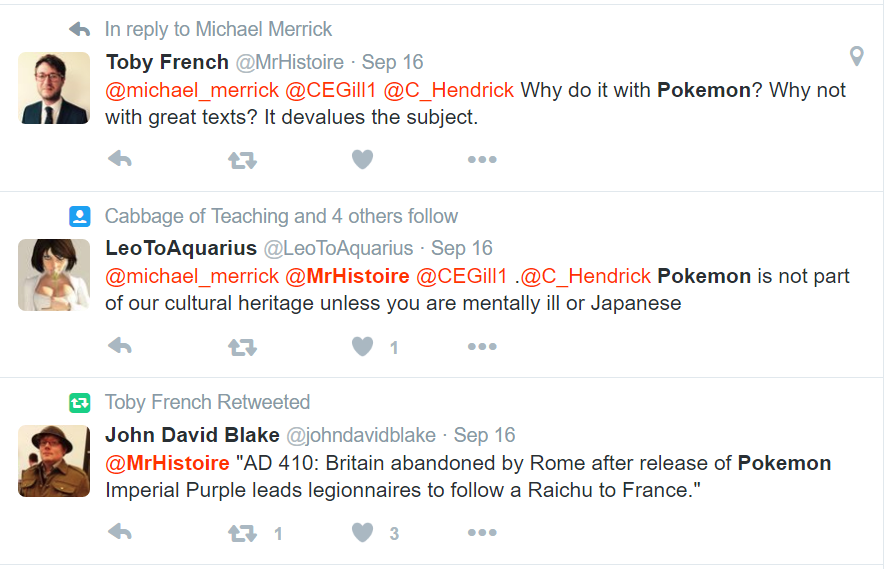"Do not ye deem, that I came to send peace into earth, I came not to send peace, but sword. For I came to part a man against his father, and the daughter against her mother, and the son's wife against the husband's mother" [Matthew 10: 34-35]
I have found myself pondering more and more on these verses from Matthew over recent months. To all intents and purposes, I feel like the world around me has become one of stark binaries. Friend or foe? Believer or unbeliever? Leave or remain? Corbynite or a Blairite? Pro-grammar or pro-comprehensive? Neo-trad or progressive? Child-centred or discipline focused? The list goes on and the arguments are endless and largely fruitless. It turns out that I am not the only one to have noticed this. As I was writing this blog, Ed Podesta posted an excellent piece on the same issue. I fear this will be much less eloquent, however I would like to add my own thoughts as one of the people who finds these sharp divisions both troubling and counter-productive.
This blog was prompted by two recent events. In the first instance, I posted a letter sent to a friend’s Finnish parents. The letter demanded they leave these shores and stop “polluting the air”. Within seconds, my timeline was filled with tweets acclaiming or decrying such actions. Those on the left of the debate were soon demanding various forms of corporal punishment for the offender and implying that all Leave voters shared such sentiments. Meanwhile, those on the right called me a liar and demanded I prove the verity of the letter, or dismissed it as irrelevant. I took the post down.
Never a week seems to go by now when some new horror is showcased on Twitter as evidence that teaching is going to Hell in a handcart. These are almost never discussions but polemics: Pupils should ALWAYS/NEVER be punished if their parents don’t pay for school lunches, with a worrying smattering of abuse! Children SHOULD BE/NEVER BE isolated if they forget a pen or wear their uniform incorrectly? Teachers should ALWAYS/NEVER use computers or PowerPoint for their lessons! So much of what is published is a tribal points-scoring exercise – a way to demonise the “Neo-Trads” or mock the “Progressives”. Those who have deigned to suggest it might be a little more complex have either been forced to hold their counsel, or have been utterly ignored. The result is an educational debate which is dominated by those who yap and snarl the loudest. Is this really the professional dialogue we want to foster? I for one hope not.
I am troubled every time the Twitter police come out because theirs is the language of derision rather than useful dialogue and construction. There seems to be an assumption that if a teacher makes a choice to approach a topic, or lesson, or discipline in a manner contrary to their thinking, it is an action of ignorance rather than an informed decision. The most recent example to do the rounds was in response to a teacher who had posted a list of ways to bring Pokémon Go into the classroom. Now I take the view that that the suggestions were largely problematic as they put engagement or glib relevance to be the centre of the curriculum rather than the subject being taught. However, most responses took issue to the use of computer games in the context of history or English lessons full-stop. I have included a sample of responses below:
In some ways this is an even more important question. My educational philosophy is quite traditional in a lot of ways. I am supportive of classrooms having clear rules and routines, however if the classroom is swelteringly hot, I am not opposed to letting pupils undo a top button, as long as they put it back when they leave. I believe in the power and importance of curriculum and careful curriculum design, but when the revolutions began in Egypt and Libya in 2011, I took some time out to help children understand what was happening. I firmly believe in helping children develop their cultural capital through knowledge-rich lessons, but I also think it is important to encourage them to challenge what counts as “cultural capital” in the first place. I genuinely think that some of the more extreme aspects of child-centred education have caused issues in schools up and down the country, yet I still see the value in getting students to work with source materials and engage in the process of historical enquiry. I am a stickler for getting homework on time, but if someone tells me they had a family tragedy, I will waive the usual detention. All of these decisions are not compromises but rational choices, yet many would cause outrage amongst certain groups on social media.
Fundamentally I am aware that, like so many others, I hold multiple views on the purpose of education, and therefore need to hold them in constant tension. I believe in the need for a strong academic foundation for all, but I also think high quality technical education can complement this. I think children need routines and stability, but I also know that sometimes we all need a break from rigidity. I try to make every lesson I teach an opportunity to fascinate, inspire and engage pupils with history, but I am also aware that my ability to teach rests on developing meaningful and lasting professional relationships with the pupils I teach. Being a professional means taking decisions on how to strike these balances every day. I am happy to make the case for my approach but I am not so blind as to assume that I always get it right, or that another way might not have merits also. It sometimes feels like teachers, even those for whom I have a great respect, seem to think they have been a God-given mission to save teaching from itself by crusading against purposes with which they disagree. Would I like more people to adopt some of these more traditional approaches to teaching? Yes, of course. Do I think that I will achieve this by being a zealot for the cause? No!
If we look at the best examples of meaningful and lasting change in history, they are often (though not always) won gradually. The violent reforms of the Protestant thinkers of the 16th Century only slowly took root as the conflicts subsided in the 17th Century. In the same way, the zealots of the English Civil War enjoyed only a temporary victory. In the end it was a series of accommodations which allowed the English political system to move in a more democratic direction. Even early Christianity may not have got very far if they had adhered to Peter’s original mission to convert his Jewish fellows to the new religion. Many would argue that it was Paul’s missions to the gentiles which allowed Christianity to become more than a minor Jewish sect. He opened the religion up by making a choice to allow those for whom belief in a single God was not culturally familiar. In doing so, Paul created a great deal of fragmentation within the church, but he also allowed it to spread and influence a wider audience. I offer none of the above illustrations as allegories, yet I can think of few historical examples where meaningful and lasting change has been achieved through adversarial posturing.
If we are serious about changing education and schools in this country, we need to be able to engage with and accommodate those teachers for whom the extremes of “traditional” education are currently too much of a stretch. Unless we make this effort we risk become deafened in the echo chamber of our own ranting and blinded by the myopia of our prejudices. Bringing a sword and creating division is easy, winning hearts and minds through dialogue and gradual accommodation takes both hard work and commitment. Which of us is willing to commit to that cause?






 RSS Feed
RSS Feed
